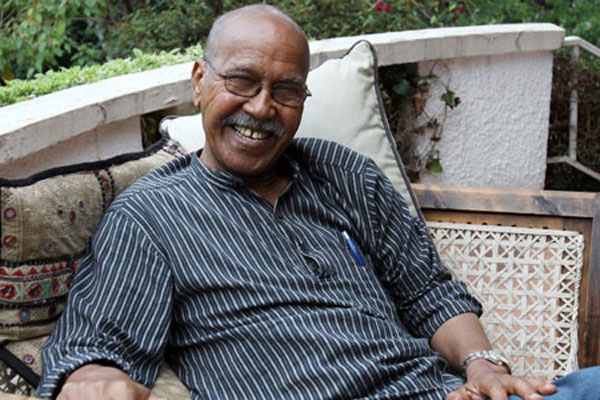Nuruddin Farah is a Somalian novelist, dramatist, short story writer and translator, whose career was shaped by the experiences he had growing up in times of war in his country of Somalia. Born on November 24, 1945, Nuruddin Farah grew up in the city of Baidoa, Somalia. Before his birth, Baidoa was under Italian control before the British had taken over the Italian controlled sector after the events of World War II. With this shift in power in Somalia, Farah grew to be fluent in languages such as English, Italian, Arabic, and Amharic (the predominant language of Ethiopia).

Farah’s parents were his father, Hassan Farah, a merchant and his mother, Aleeli Faduma Farah, a known oral poet. He began his education in Kelafo, a city located in the Ogadea area by the border of Ethiopia.

Due to conflicts between Somalia and Ethiopia near the Kelafo area, Farah’s family fled to the city of Mogadishu. In Mogadishu, he had become a clerk-typist for Somalia’s Ministry of Education in 1964. In 1966, he later went to study at the University of Punjab in Chandigarh, India to study three years of philosophy, literature, and sociology. While at the University of Punjab, he had met his first wife, Chitra Muliyil Farah, who gave birth to his son, Koshin Farah, in 1982. He later divorced Chitra Farah in 1992. As well, he had began to write and complete his first novel the, From a Crooked Rib, in 1970. This novel was the beginning of Farah’s list of books that carried strong feminist and social justice themes.

While he was away from Somalia, a military coup had taken place, being led by Somali army officer, General Siad Barre in 1969. Ousting the previous regime, Barre’s regime was seen as a new time of progress for Somalia at the time, with Barre’s regime requiring the Somalian language to be put into a written format. At the time, Farah and many other Somalians would see his regime as the beginning of a time of progress in Somalia.
Returning to Somalia, Farah taught at a secondary school in Mogadishu and later became a university teacher for comparative literature, where he would begin writing his second book, A Naked Needle, and completed it in 1976. This novel was a cross culture love story between people of different races. This was also one of his only works to be written in the newly written Latin script Somali language and was serialized in newspapers for a short time. The novel became especially controversial in Somalia as it depicted Somali life that the Barre regime did not approve of.

Since A Naked Needle included descriptions of Somali life that the Barre regime deemed unacceptable, Farah received a message from his brother before taking a flight back to Somalia in 1976. He was returning to Somalia after studying play-writing at the University of England and University of Essex. His brother warned him to never return to Somalia or else the regime will take him.
In exile, Farah lived in many other African countries such as Uganda, Gambia, and Nigeria to name a few. During this time he wrote a trilogy of books that would be called the “Variations on the Themes of an African Dictatorship”. The novels were, Sweet and Sour Milk, Sardines, and Close Sesame. Each of these novels described a ruthless dictatorship under a military regime. By 1991, Farah could have returned to Somalia because of the ousting of the Barre regime, however, he did not return to Somalia until 1996 because of a civil war that began during the ousting of Barre’s regime. In 2007, Farah became a diplomat for the new Somali Government to settle the dispute with the new government and a rising Islamic Fundamentalist group in Somalia.
In 1998, Farah had won the Neustadt International Prize for Literature, an award that is the world’s second most coveted award for literature next the Nobel prize. As well, he had won the Premio Grinzane Cavour from Italy, the Kurt Tucholsky Prize from Sweden, Prize for Best Novel in Zimbabwe, the St. Malo Literature Festival Prize, and the Lettre Ulysses Award from Berlin for his various works over the years.

As of 2018, Farah continues to write novels that contain many themes entailing to social justice. His latest book, North of Dawn, will release on December 4th of this year. Farah is married to his second wife, Amina Mama, who is a writer, feminist, and Chair of the Department of Gender and Woman Studies at UC Davis. They have a son, Abyan, and daughter, Kaahiye, together. He now lives in Minneapolis, Minnesota and Cape Town, South Africa.

Images Courtesy of:
Works Cited
Britannica, The Editors of Encyclopaedia. “Nuruddin Farah.” Encyclopædia Britannica, Encyclopædia Britannica, Inc., 17 Apr. 2015, www.britannica.com/biography/Nuruddin-Farah.
Farah, Nuruddin. “Somalia at the Turn of the 21st Century.” Encyclopædia Britannica, Encyclopædia Britannica, Inc., 22 July 2005, www.britannica.com/topic/Somalia-at-the-Turn-of-the-21st-Century-1673333.
“Farah, Nuruddin.”. “Farah, Nuruddin.” The Columbia Encyclopedia, 6th Ed, Encyclopedia.com, 2018, www.encyclopedia.com/people/literature-and-arts/journalism-and-publishing-biographies/nuruddin-farah.
Id, Les. “Biography of Farah NURUDDINE.” African Success : Biography of Asha HAGI ELMI, 22 June 2016, http://www.africansuccess.org/visuFiche.php?lang=en&id=718.
“Nuruddin Farah.” NPR, NPR, www.npr.org/books/authors/138303853/nuruddin-farah.
Zuckerman, Ethan. “Mapping Somalia.” My Hearts in Accra, 14 Aug. 2006, www.ethanzuckerman.com/blog/2006/08/14/mapping-somalia/.